|
|
|
Sort Order |
|
|
|
Items / Page
|
|
|
|
|
|
|
| Srl | Item |
| 1 |
ID:
155493
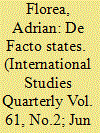

|
|
|
|
|
| Summary/Abstract |
De facto states—polities, such as Abkhazia (Georgia) or the Donetsk People’s Republic (Ukraine), that appropriate many trappings of statehood without securing the status of full states—have been a constant presence in the postwar international order. Some de facto states, such as Northern Cyprus, survive for a long period of time. Others, including Tamil Eelam in Sri Lanka, are forcefully reintegrated into their parent states. Still others, such as Aceh in Indonesia, disappear as a result of peacemaking. A few, such as Eritrea, successfully transition to full statehood. What explains these very different outcomes? I argue that four factors account for much of this variation: the extent of military assistance that separatists receive from outside actors, the governance activities conducted by separatist insurgents, the fragmentation of the rebel movement, and the influence of government veto players. My analysis relies on an original dataset that includes all breakaway enclaves from 1945 to 2011. The findings enhance our understanding of separatist institutional outcomes, rebel governance, and the conditions that sustain nonstate territorial actors.
|
|
|
|
|
|
|
|
|
|
|
|
|
|
|
|
| 2 |
ID:
142062
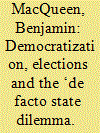

|
|
|
|
|
| Summary/Abstract |
De facto states are an anomalous, but well-discussed feature of international politics. The questions they raise for understandings of sovereignty and statehood are well advanced, but less understood are the internal dynamics of these entities particularly in relation to the development of democratic, participatory political institutions. Through an examination of the Kurdish Regional Government in Iraq from 1992 to 2014 this article will explore patterns of democratization in de facto states. Unpacking a dilemma around trends toward both exclusionary and inclusionary politics in de facto states, it is argued here that there is a positive relationship between de facto statehood and democratization. However, contrary to current views, this is the result of internal pressures and elite agency as opposed to normative pressures at the international level.
|
|
|
|
|
|
|
|
|
|
|
|
|
|
|
|
| 3 |
ID:
169781
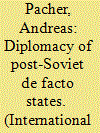

|
|
|
|
|
| Summary/Abstract |
Why do post-Soviet de facto states (such as Abkhazia and South Ossetia) regularly interact with remote Pacific islands or Latin American countries, even though they are not bound by any meaningful political, economic or military ties? This article argues that the diplomatic relationship management amounts to a strategy of external legitimacy-building through stigma rejection and ontological security-attainment. This diplomatic practice creates positively tinged social affiliations, whereby the unrecognized entities aim to have their identity as ‘normal’ states affirmed. It renders the international society’s stigma ineffective, thus facilitating a potential exit from the stigma. By illuminating the performative aspects behind the de facto states’ quest for recognition, this article uncovers the de facto states’ agency and analytically emancipates them from the structural factor of ‘Russia-as-a-great-power’. It also contributes to the literature of ontological security by highlighting how positive (rather than conflictual) relationships, and how transformed (rather than stable) identities can be conducive to its attainment. This article generally highlights the need to analyse de facto states’ foreign relations more holistically than previously done.
|
|
|
|
|
|
|
|
|
|
|
|
|
|
|
|
| 4 |
ID:
147377
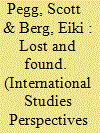

|
|
|
|
|
| Summary/Abstract |
De facto states are typically seen as marginal actors in the international system. Although they control territory and provide governance, their claims to sovereignty remain largely unrecognized. It is widely believed that such entities are either ignored or viewed with hostility by the vast majority of sovereign states. Rather than theoretically presume such relations, we empirically investigate de facto state–great power interactions through the use of a novel data set comprising 448 “WikiLeaks” US diplomatic cables from 2003 to 2010. Specifically, we examine US relations with the four de facto states of Abkhazia, Nagorno-Karabakh, Somaliland, and Northern Cyprus to test four different hypotheses designed to explain what determines the degree of US support or hostility toward individual de facto states. We find that hostility/support and isolation/engagement often go hand in hand, yet vary significantly across our selected cases. De facto states are not treated as homogenous entities and US foreign policy is quite capable of discriminating between them and calibrating its interactions with them.
|
|
|
|
|
|
|
|
|
|
|
|
|
|
|
|
| 5 |
ID:
140416
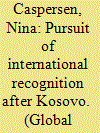

|
|
|
|
|
| Summary/Abstract |
The international recognition of Kosovo exacerbated existing uncertainties over state recognition. By its supporters it was billed as a “unique case,” but others saw it as extending the right to self-determination. Unlike most literature on state recognition, this article adopts a bottom-up approach and analyzes how other aspiring states have reacted to the new politics of recognition. Drawing on the legitimation strategies observed in five de facto states since 2008, it argues that separatist strategies are not simply shaped by changes in the practice and norms of state recognition. They are constrained, both internally and externally. While there is greater divergence in official strategies since 2008 and a greater emphasis on international engagement, the substance of the strategies is much more homogenous and demonstrates a great deal of continuity.
|
|
|
|
|
|
|
|
|
|
|
|
|
|
|
|
| 6 |
ID:
179204


|
|
|
|
|
| Summary/Abstract |
Do authoritarian regimes engage in active export of their political systems? Or are they primarily concerned about their geopolitical interests? This article explores these questions by examining Russia’s policy towards Abkhazia, South Ossetia, and Transnistria. In all three de facto states, Moscow is fully able to dictate election outcomes should it desire to, but, we argue, has increasingly refrained from doing so. These client states are unlikely to attempt to escape from Russia’s tutelage; and with its geopolitical interests fully ensured, Russia appears willing to grant them latitude. We then ask whether these findings can be extrapolated to serve as a template for understanding Russia’s policy towards its client states more generally, discussing Moscow’s reactions to attempted regime change in Armenia and Belarus.
|
|
|
|
|
|
|
|
|
|
|
|
|
|
|
|
| 7 |
ID:
187379
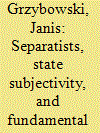

|
|
|
|
|
| Summary/Abstract |
Ontological security studies (OSS) in International Relations (IR) emphasize the role of identity, anxiety, and a sense of self in world politics. Yet suggesting that states act in certain ways because of ‘who they are’ also assumes that they are in fact states. In this article, I problematize the presupposition of state subjects in the context of separatist conflicts in which claims to statehood compete and overlap. Where unrecognized de facto states are pitted against their unyielding parent states, the two threaten each other’s very state personhood, thereby presenting a more radical challenge to their existence than traditional ‘physical’ and ‘ontological’ security threats. Separatist conflicts thus reveal a widely overlooked dimension of fundamental ontological security, provided by the constitution and recognition of states as such. Moreover, because of the exclusiveness of state subjects in the modern international order, any third parties attempting to resolve such conflicts inevitably face a meta-security dilemma whereby reassuring one side by confirming its claim to statehood simultaneously renders the other side radically insecure. Thus, rather than regarding particular state subjects as merely the starting point of quests for ontological security in international relations, they should also be understood as already their result.
|
|
|
|
|
|
|
|
|
|
|
|
|
|
|
|
| 8 |
ID:
114099
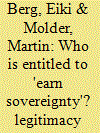

|
|
|
|
|
| Publication |
2012.
|
| Summary/Abstract |
Abkhazia and Nagorno-Karabakh are internationally unrecognised political entities, or so-called de facto states, that have emerged as a result of the incomplete and contested state-formation of their parent states and of the secessionist movements that emerged in the power vacuum of the post-Soviet space. In addition to examining the conventional reliance on the self-determination principle, usually followed by a call for international recognition (as often practised by emerging sovereigns), this article aims to survey whether these political entities have proved that they embody 'rightful authority' as such and whether they 'have earned their sovereignty'. In other words, it attempts to examine the self-determination claims in Abkhazia and Nagorno-Karabakh based on legitimacy criteria that are widely accepted for liberal democratic societies using an analysis of the respective issues as they were represented in focus-group discussions in these two regions.
|
|
|
|
|
|
|
|
|
|
|
|
|
|
|
|
|
|
|
|
|